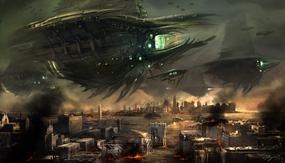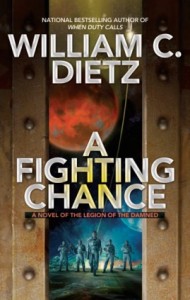 How do you go about organizing a videogame’s script before sharing with the developer? I.e., have you found that there’s an accepted screenplay format in the videogame industry, and certain software useful for churning it out?
How do you go about organizing a videogame’s script before sharing with the developer? I.e., have you found that there’s an accepted screenplay format in the videogame industry, and certain software useful for churning it out?
I think I’ll rely on my experience with Resistance: Burning Skies to answer this question because it’s a more typical situation than working on a game related to your own IP. I have learned a great deal from my co-writer Mike Bates, including the screenplay format that Nihilistic prefers, which is probably very typical. But Mike tells me that the formats used in the gaming industry are still in flux and vary from place to place.
Sony flew me down to visit with the Nihilistic team at the beginning of the project, but since then Mike and I have done most of our writing using Google Docs, which I liken to playing in a jazz band using words instead of instruments. I can see what he’s writing, he can see what I’m writing, and we can do it at the same time! That means you can say, “Hey, Mike, what do you think of this?” And write a riff. Feedback is instantaneous — and we’re hundreds of miles apart. Cool stuff.
And while we’re on that topic, how has the interaction between script writer and game designer differed on the Legion of the Damned project compared to the conspicuously big-budget Resistance: Burning Skies for the PlayStation Vita? Do you find you’ve had more fluid interaction with Offworld Games, as far as being able to trade ideas and make suggestions that influenced how the final product is shaping up?
Simple answer, yes. For obvious reasons my relationship with Conlan and his team is different than the one I have with Sony/Nihilistic. Plus we’re talking about the Resistance universe here. That includes three games from Insomniac, two tie-in novels from me, and other media as well. That means there’s a complex history to keep straight, plus lots of players, all of whom have a stake in what we write. Fortunately Mike keeps everything coordinated.
 Finally, what strengths of storytelling-via-book seem to get lost in the transition from novel to videogame? And what advantages do you feel videogames might offer as a storytelling mechanism compared to the written page?
Finally, what strengths of storytelling-via-book seem to get lost in the transition from novel to videogame? And what advantages do you feel videogames might offer as a storytelling mechanism compared to the written page?
Even though CGI keeps getting better and better, and the quality of what people produce is amazing these days, there’s no substitute for the vast sweep of the reader’s imagination. As we read a book, each one of us creates our own individual, and therefore satisfying, mind-image of what’s going on, and it will be awhile before neuroscience can hook into that and throw it up onto a screen. Or translate it into a holo.
Still, except for works by the very best authors, it’s hard for a book to compete with the intensity of a good FPS! Well produced games have it all: They deliver a good story (hopefully), compelling characters, suitable music, a puzzle of some sort, and provide the player with an emotional payoff once they win. That’s hard to beat.
Our sincerest thanks goes to Bill Dietz for taking the time out of his schedule to answer our questions, and to Rodika at Offworld Games for organizing this exchange. You can find an excerpt from Dietz’ Legion of the Damned and search for more of his works at Amazon. The final book in the Legion series, A Fighting Chance, releases November 1.
Stay tuned for Part 2 of our interview about Offworld Games’ Legion of the Damned, where we chat with game designer Conlan Rios!


